- Author Jason Gerald gerald@how-what-advice.com.
- Public 2023-12-16 10:50.
- Last modified 2025-01-23 12:04.
We've all eaten too much at times on vacation, and then regretted having finished two servings of Grandma's special curry. However, compulsive binge eating is a much more serious condition and is the most common eating disorder encountered, especially in the United States. The activity of consuming large amounts of food quickly that is chronic can result in feelings of regret, helplessness and immense shame. Worse yet, overeating can also trigger some serious health complications related to weight gain, especially type 2 diabetes, high blood pressure and heart disease. Therefore finding ways to reduce your food consumption is the key to living a healthy and happy lifestyle.
Step
Part 1 of 5: Overcoming Emotional Reasons for Overeating
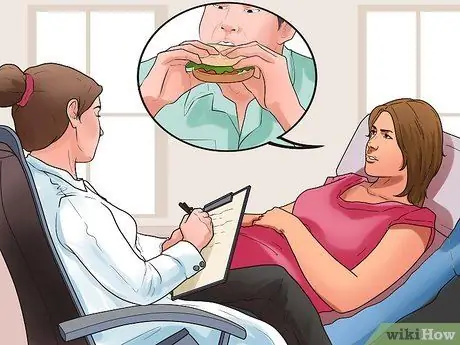
Step 1. Consult a therapist, especially if you suffer from binge eating disorder (BED)
In many cases there are deep-rooted psychological problems that contribute to compulsive eating disorders. Seeking help from a trained counselor can help uncover underlying issues with this habit such as anxiety, depression or a negative body image that can hijack your ability to control yourself.
- There is overwhelming evidence that the majority of people diagnosed with BED also have an underlying mood disorder.
- Even if you don't have BED, a therapist can be very helpful if you have a habit of eating when you're stressed. A therapist can help you figure out what's causing you to feel anxious, depressed, sad, etc. and help you learn healthy ways to deal with these emotions.
- Bring your food diary to your therapist's meeting so you can share information about your habits with the therapist. Looking through the diary may also help the therapist, as he or she may be able to identify patterns or triggers that you weren't aware of.
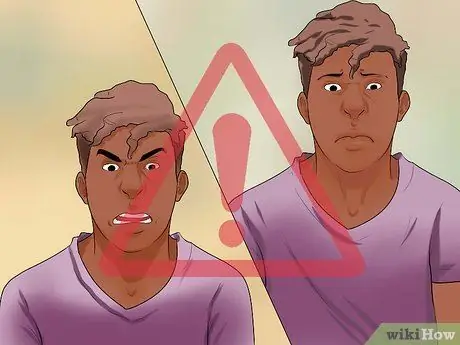
Step 2. Manage your anger and sadness
Emotional eaters often hide their feelings and turn to food to feel better. Learning healthy ways to deal with negative emotions can have an impact on overeating - although you may feel that the problem is that you can't control how much you eat, chances are the main problem is that you feel you can't control your emotions. When you start to feel angry, sad or other unpleasant feelings, find healthy ways to express or deal with those emotions. Call a close friend, start journaling or start painting - engage in constructive activities that you know will make you feel better, not worse. If your feelings of anger or sadness stem from past wounds, it may help to deal with them in the following ways:
- Write letters to people who have hurt you. You don't have to send the letter, but the act of putting your anger and sadness on paper can often help relieve stress.
- Make peace with yourself. Stand in front of the mirror and forgive yourself for everything that hurt you. Any self-hatred you carry must be discussed and expressed to begin the healing process.
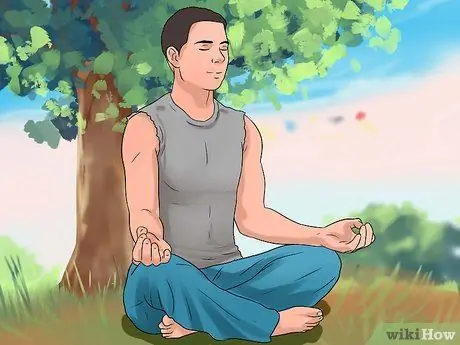
Step 3. Restraint eating habits when stressed
Avoid reaching for your favorite comfort food when stressed. Recognize when you feel overwhelmed by stress and find other ways to vent it. Some of the following stress-reducing techniques can help:
- Take a walk for a while. Even a 15-minute walk can help your body release feel-good endorphins in your brain, which can help relieve stress.
- Play with pets. Spend time devoting your pet to the release of the hormone oxytocin, a chemical produced when you're with a loved one that promotes feelings of happiness.
- Breathing exercises. If your mind is filled with thoughts, take a moment to focus on something as simple as your breath. Refocusing on the present moment through breathing exercises or meditation has been scientifically proven to reduce stress and anxiety.
- Do yoga.
- Learn how to meditate. Meditation is a stress buster that can usually be done anywhere.
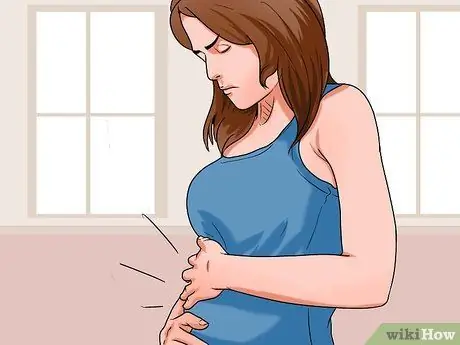
Step 4. Learn to listen to your stomach
Frequently asking "Am I full?" to yourself can sometimes immediately make you look at things objectively. Often times, we eat as we please without paying attention to what our bodies are trying to tell us. People with binge eating habits usually continue to eat even long after their stomachs are full. But they ignore the messages their bodies send.
-
Rating your hunger level on a scale of one to 10 can be very helpful. A scale of 1 means that you are so hungry that you feel dizzy, weak or hungry and 10 means that you are so full that you feel nauseous. Five means feeling satisfied - neither hungry nor full.
- Eat when your hunger level is at three or four and try to avoid hunger levels at one or two.
- Stop eating when you reach five or six - either feeling satisfied or "pleasantly full"
- Stop a quarter of a way while eating and ask yourself: "Am I still hungry?" If you are still hungry, continue eating. Then stop back when you're halfway there and ask "Am I still hungry?" Remember, you don't have to finish your plate.
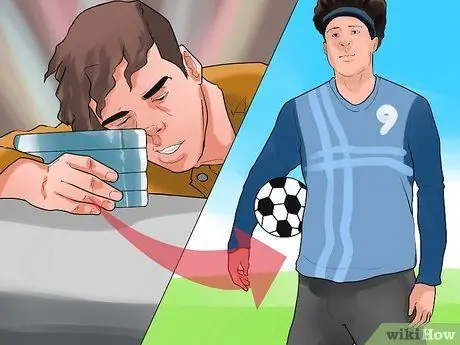
Step 5. Relieve boredom
Many people overeat just because they are bored. If you feel you have too much free time, get out of the house. Find a hobby. Volunteer to help people in need. Go to the movies (but stay away from hawker stands). Call a friend to fill your mind with activities that don't involve eating sweets.
Part 2 of 5: Getting Rid of Other Behaviors That Cause Overeating
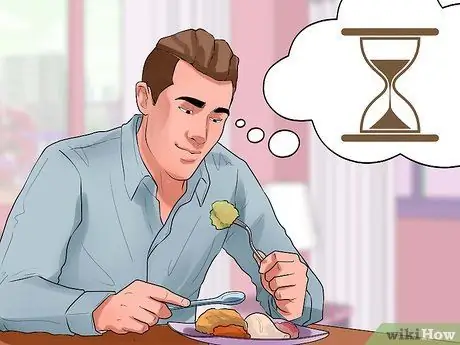
Step 1. Eat slowly
Overeating includes consuming food very quickly. But eating slowly and taking the time to focus on the food itself (how it tastes, the temperature, etc.) can sometimes help soothe the urge to overeat. This kind of careful eating has become a well-known technique for reducing overeating and has been endorsed by doctors, celebrities, cooks and the like.
- Do not eat standing up, while in the car or when you are trying to do other activities. Sit down to eat your meal. Try to avoid situations where you have to eat your food very quickly.
- Stop and place your spoon between each bite.
- Chew your food thoroughly and swallow before lifting the spoon back up.
- Allow yourself to feel the texture of the food and pay attention to the taste and aroma.
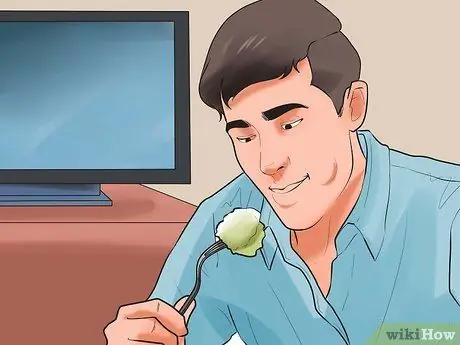
Step 2. Turn off the television
It's possible that the cause of your eating isn't stress or other feelings - you may be eating too much simply because you're too distracted to listen to your body's signals. Avoid distractions while eating - turn off the television and computer, close your books - and focus on the contents of your plate and how your body feels. Researchers have found that eating while watching television regularly results in the consumption of less fruit and vegetables and more consumption of fast food, soda and unhealthy snacks.
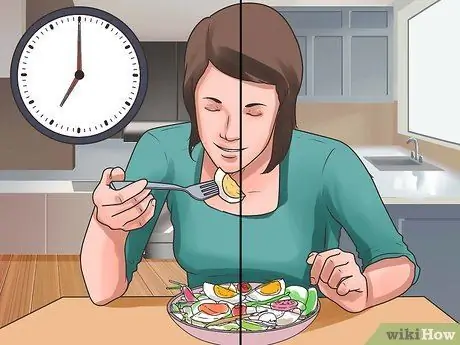
Step 3. Change your environment
Humans are creatures with habits. Using a different plate or sitting where you don't usually eat can give you the extra awareness needed to stop eating at the right time. As one registered dietitian once said, small things like changing meal times and reducing plate size for dinner can make big changes over time.
Part 3 of 5: Developing Good Habits
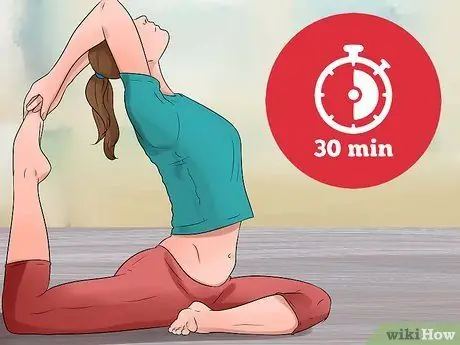
Step 1. Start exercising
Get up and move. The mood-boosting effects of exercise are well known. Exercise can reduce stress hormones and improve your energy and mood. Set a goal to do moderate-intensity exercise for 20 to 30 minutes each day. Some forms of exercise that increase morale include:
- Yoga
- Swimming
- Climb a mountain or hill
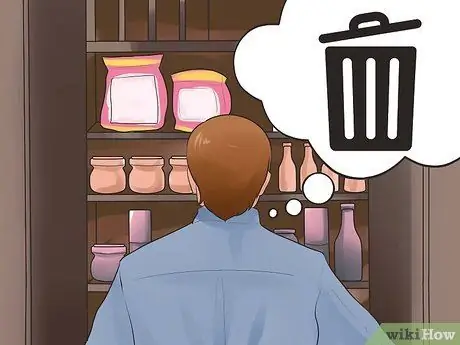
Step 2. Get rid of temptation
Clear the pantry and refrigerator of your favorite comfort food. You can't eat something that doesn't exist and now that you've kept a food diary and know what foods you often overeat, keep this information in mind when you go to the grocery store. If you often drift into the temptation of cookies and chocolate chips, two of the most common food triggers for overeating, make sure you avoid the section that sells sweets and snacks.
Stay within the perimeter of the grocery store. Cookies, chips, soda and other unhealthy snacks are commonly found in the aisles of grocery stores, while you'll find things like produce, fresh meat and seafood around the grocery store perimeter
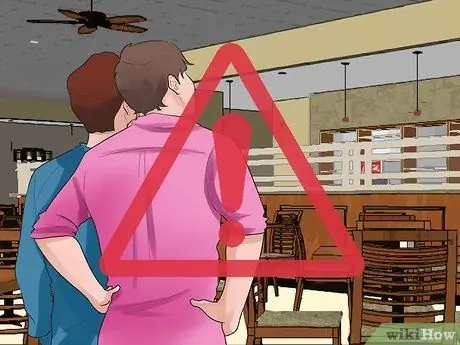
Step 3. Stay away from fast food
Fight the urge to visit your favorite drive thru outlet on your way home from work. The stress of the day can cause you to order a lot of foods that are high in fat and sugar. If your resolve is still faltering and you end up finding yourself in a queue, consider ordering a healthier salad or a low-calorie menu instead of the usual nutrient-dense meal.
Part 4 of 5: Coping With Overeating Today
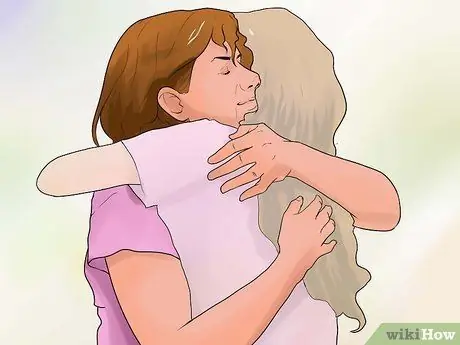
Step 1. Forgive yourself
There's a lot of setbacks going on and that's fine. Bad habits that last for years will not stop overnight. Try to be patient with yourself and reward yourself with kindness and forgiveness.
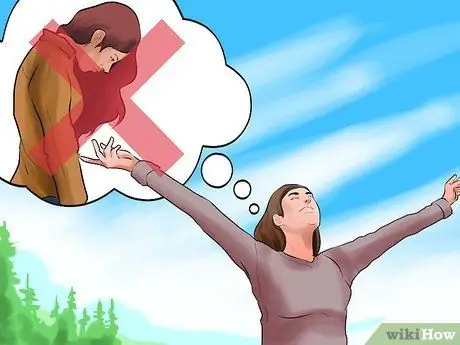
Step 2. Let go of shame
Drowning in shame, anger and sadness will only create a vicious cycle that leads to the habit of overeating that gets worse. Some constructive ways to express disappointment that don't involve overeating include:
- Saying goodbye to the past. Everything you have done now is in the past. Remind yourself that the past cannot be changed but the future can still be changed. All you can do is learn from your mistakes and keep moving forward.
- Find out why you're out of control. Thinking about and writing about what is driving you astray (trigger foods, feeling certain emotions, etc.) can help reduce feelings of guilt and put your focus back on recovery.
- Set positive reminders. Help yourself reduce your shyness by creating ways to improve yourself in the future. Use an app or install calendar reminders on your computer to send yourself positive messages.
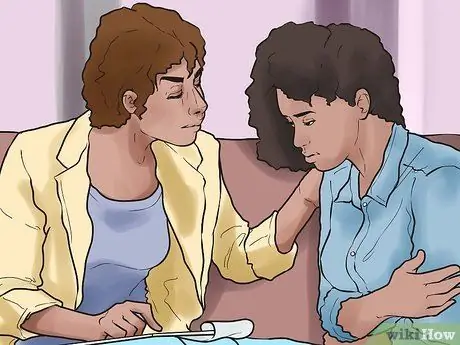
Step 3. Seek support if needed
Going through this problem alone is hard. Finding other like-minded people can be an important part of the recovery process. There are several national organizations with meetings at regional and local branches that you can attend. Or, if you can't wait to talk to someone right away, find and contact other people online in a chat room or join a forum or message board:
- Overeaters Anonymous or a support group that helps people with binge eating habits.
- NEDA (if you are in the United States)
- Academy for Eating Disorders
- Healthful Chat website
- Healthy Place Forums
Part 5 of 5: Understanding Overeating
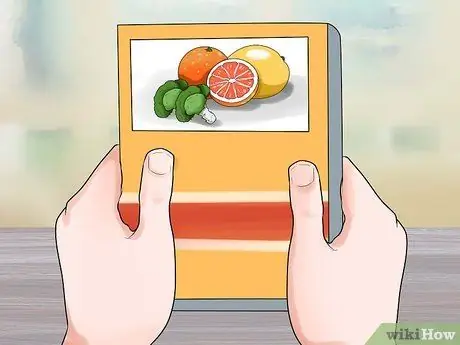
Step 1. Keep a food diary
Ignorance does not always give a feeling of peace. Writing down everything you eat can be an eye-opening experience, as most people tend to underestimate how much food they eat. Also, keeping track of the times you eat can help identify trouble spots, namely certain times of the day when you tend to overeat. Or, a food diary can quickly show you what foods you overeat most often.
- When keeping a food diary, you should include when you ate, what you ate, how much of the food. In addition, you should also note what you were doing, your mood and your environment at the time of the meal.
- Bring a pen and paper or use a smartphone to record your food intake. Don't rely on memory - remember, most people underestimate how much they eat and you are more likely to do so when relying on memory alone. You can also forgo small snacks (a handful of candy from a jar on a coworker's desk for example) or a bite of cake from your friend's plate (these all count too).
- Make sure you accurately record portion sizes and side dishes such as salad dressing.
- You can see a sample food diary here.
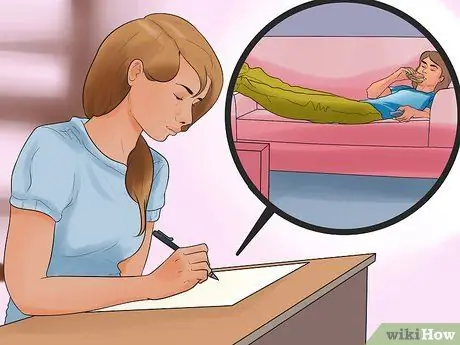
Step 2. Notice any patterns in your food diary
By recording additional details in your diary, such as your mood or environment at which you eat, you can begin to uncover patterns and triggers for overeating. For example, you may notice that you overeat when you are stressed or sad or when you are at your parents' house or after you talk to an older sibling. This is considered to be eating out of stress or eating emotionally.
- Other things to watch out for include taking long breaks between meals (which can cause you to overeat when you finally eat) and eating while on the move (such as in the car or while standing up and trying to do other activities) or in front of the television. or a computer (most people tend to eat more when their attention is distracted and not focused on food).
- Be aware of the effects of inhaling aromas or looking at food. Perhaps your diary will show you that you can't resist the urge to buy some food when you walk through a wonderfully smelling bakery on your way home. Even if you weren't hungry before, the smell of freshly baked bread can make your stomach growl.
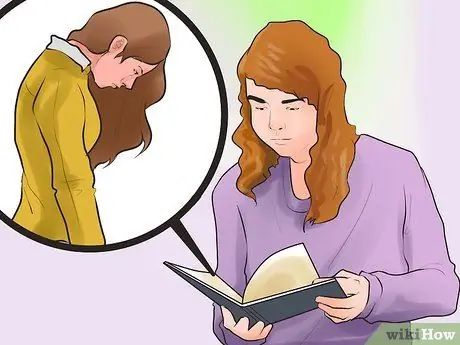
Step 3. Find out about emotional eating behavior
Your food diary may indicate that you eat to cope with difficult emotions or perhaps simply boredom. Do you take food whenever you feel sad, stressed, angry, restless, lonely, bored or tired? Instead of dealing with unpleasant feelings, you may try to temper them by eating. Unfortunately, eating doesn't solve anything that's causing you to experience that unpleasant feeling. While you may feel better in the moment, eventually the bad emotions will return.
Stress causes the body to secrete the hormone cortisol, also known as the "stress hormone" which can trigger the body's response to "fight or flight" when faced with a problem. This response can increase your appetite, causing your body to crave sedative foods (usually those filled with sugar and quick energy) to fuel the fight-or-flight response. If you suffer from chronic stress from school, work, family or the environment, you have a higher risk of becoming an emotional eater
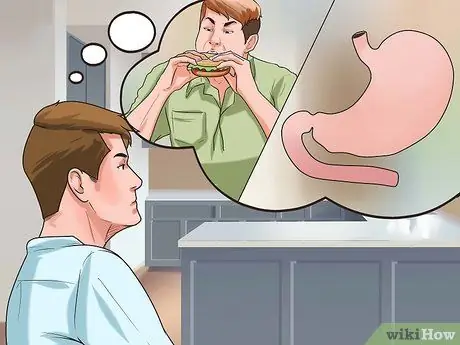
Step 4. Understand the difference between physical hunger and emotional hunger
At first it may be difficult to recognize when you are really hungry and when you are eating because it is triggered by emotions. Before you devour the cake or chips in front of you, consider the following:
- Did the hunger come suddenly? Physical hunger comes gradually while emotional hunger comes suddenly and intensely.
- Do you feel like you need to eat right away? Physical hunger can usually wait. When you are hungry because of emotions, you will feel that you have to eat right now.
- Do you only crave certain foods? If you are open to any food choices, chances are you are experiencing physical hunger. But if you're fixated on one particular food, chances are you're feeling emotional hunger.
- Are you eating beyond feeling full? If you eat until your stomach is full but still feel dissatisfied, you are likely eating emotionally and not to satisfy physical hunger. Physical hunger will stop when your stomach is full.
- Do you feel sorry, ashamed, helpless or disgraced? If you are experiencing these feelings, you are likely eating to try to satisfy an emotional need, not to satisfy a physical hunger.
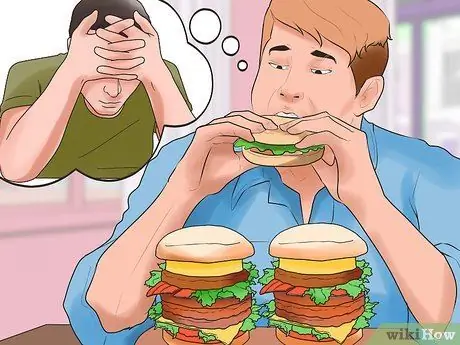
Step 5. Be aware of the signs of BED
Overeating or overeating doesn't necessarily mean you have BED. BED is a common eating disorder. This disorder is considered severe and life-threatening, but it can also be cured. BED can only be diagnosed by a healthcare provider, so make sure you talk to your doctor if you suspect you have BED. Signs of this disorder include:
- Eat much more quickly than normal and eat more over a period of time (usually less than two hours) than most people eat at the same time.
- Feeling out of control when eating.
- Eat in private because you are embarrassed by how much food you are eating.
- Consuming excessive amounts of food when you are not hungry.
- Feeling embarrassed, regretful, depressed or disgusted by how much food you eat.
- No attempt to remedy the situation for the next overeating, meaning you're not trying to compensate by spitting up food or over-exercising.
- Do this type of eating at least once a week for three months.
- Be aware that weight is not definitely related to BED. Your weight may be normal, or you may be mild, moderate or severe obesity. It is important for you to remember that not everyone who is overweight has the habit of overeating or suffering from BED.






